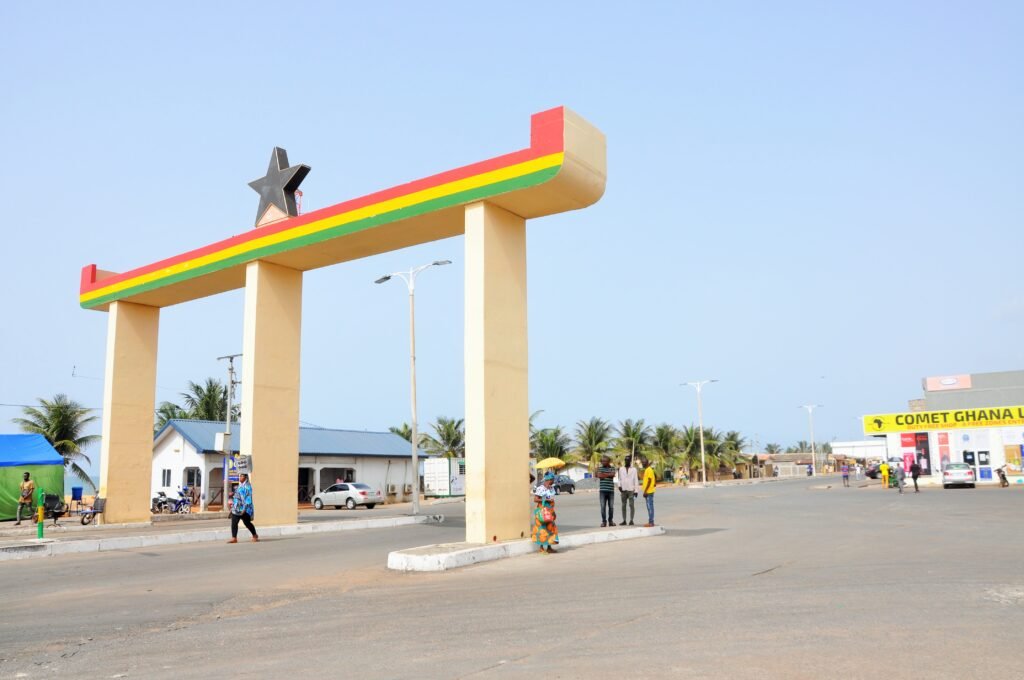
Ghana’s Geographical Layout and Neighboring Countries
Ghana is strategically located in West Africa, bordered by the Atlantic Ocean to the south, making it an important nation within the Gulf of Guinea region. This maritime access not only provides Ghana with a lengthy coastline of approximately 565 kilometers but also enhances its economic potential through trade and tourism. Its geographical position is further distinguished by its land borders with three countries: Côte d’Ivoire to the west, Burkina Faso to the north, and Togo to the east. Each of these neighboring countries contributes significantly to Ghana’s cultural and economic tapestry.
The border with Côte d’Ivoire is particularly noteworthy, as it facilitates a vibrant trading relationship that includes cocoa, a crucial export for both nations. This border has historically been a site of cultural interchange, with the diverse ethnic groups in the region sharing traditions, languages, and customs. The mutual understanding and economic cooperation fostered through this border emphasizes Ghana’s role as a hub for regional trade.
To the north, Burkina Faso shares a border with Ghana that also plays a pivotal role in commerce and cultural exchange. The northern border is often characterized by cross-border trade initiatives that benefit communities on both sides, further promoting resilience and economic development in the region. Additionally, various cultural links, including festivals and traditions, are observed along this stretch, illustrating the interconnectivity of the two nations.
Finally, to the east, Togo’s border with Ghana symbolizes an enduring relationship that dates back to pre-colonial times. The historical context surrounding this border involves various colonial influences that have shaped national identities and affected bilateral relations. Overall, Ghana’s geographical layout and its borders with Côte d’Ivoire, Burkina Faso, and Togo reflect the country’s dynamic position in West Africa, reinforcing its significance in terms of regional cooperation and cultural exchanges.
Cultural Fusion at the Borders
The international borders of Ghana serve as vibrant meeting points for diverse cultures, fostering an environment rich in traditions, languages, and lifestyles due to the proximity to neighboring countries. This cultural melting pot is particularly notable in border towns, where cross-cultural interactions enrich the local communities. One significant aspect of this cultural blend is the multitude of cross-border festivals that celebrate the unique heritage of each nation while promoting unity and understanding.
For instance, the annual Panafest (Pan-African Historical Theatre Festival) attracts people from across the region, including neighboring countries like Togo and Burkina Faso. This festival showcases performances, art exhibitions, and discussions centered on African culture and history, offering a platform for participants to share and celebrate their diverse backgrounds. In addition, the Fete du Fromage in Togo, located near the Ghanaian border, exemplifies how culinary exchanges foster connections between nations, as Ghanaian citizens often partake in this festival to enjoy diverse cheese varieties and engage in cultural festivities that transcend borders.
Another highlight is the popular Abibiman Festival, which occurs in Ghana’s Volta Region, drawing attendees from nearby countries. This festival showcases traditional dances, music, and crafts, emphasizing the region’s cultural diversity. Engaging with neighboring communities fosters collaboration and shared experiences, allowing for meaningful interactions among residents and visitors alike.
The interactions at Ghana’s borders reflect the rich tapestry of West African culture, where shared history and social ties create a unique sense of community. People from different backgrounds often find common ground, reinforcing the idea that culture is not confined by geographical boundaries. Ultimately, these cultural fusions at Ghana’s international borders reveal the beauty of diversity and the harmonious coexistence that can thrive through shared experiences.
Economic Activities and Trade Dynamics
Ghana’s international borders play a pivotal role in shaping the nation’s economic landscape, particularly through trade routes that facilitate the movement of goods and resources across its frontiers. The country shares borders with Côte d’Ivoire to the west, Burkina Faso to the north, and Togo to the east, enhancing its strategic position in the West African region. These borders have become vital conduits for economic collaboration with neighboring countries, fostering close ties and interdependence.
Key economic activities along Ghana’s borders include the exchange of agricultural products, minerals, and textiles. Ghana is renowned for its cocoa production, which is not only a staple commodity for export but also a crucial ingredient in regional trade. Other agricultural products such as cassava, yams, and palm oil also flow across the borders, contributing significantly to both local economies and Ghana’s GDP. Mineral exports, including gold and bauxite, represent another critical sector, with trade agreements in place that facilitate the extraction and exportation of these resources efficiently.
Moreover, formal and informal border markets have emerged as essential platforms for local communities, enabling them to engage in commerce and thereby improve their livelihoods. Informal trade at these borders often accounts for a significant portion of transactions that occur, allowing residents to obtain goods not readily available in their local markets. The presence of border markets supports small-scale traders and empowers entrepreneurs by providing them access to broader consumer bases.
The impact of border policies on trade practices is significant, as these regulations dictate tariffs, customs procedures, and import/export limitations. Over time, these policies have evolved in response to regional economic shifts, global market trends, and bilateral collaborations. By understanding the intricacies of Ghana’s border economy, stakeholders can better navigate the complexities of trade and leverage opportunities for growth and development.
Challenges and Opportunities at the Borders
The international borders of Ghana present a unique combination of challenges and opportunities. One notable challenge is border security, where illegal activities, including smuggling and human trafficking, pose significant risks. Smuggling of goods such as arms, drugs, and contraband is a persistent issue, exacerbated by Ghana’s strategic geographic location in the West African region. These illicit activities not only undermine the nation’s economy but also threaten national security and public safety. In response, the Ghanaian government has implemented various border control measures and collaborated with neighboring countries to establish more robust monitoring systems.
Moreover, immigration policies have become a crucial aspect of border management. With a growing number of migrants traversing the borders in search of economic opportunities, the need for a comprehensive immigration policy has intensified. To address these challenges effectively, the Ghanaian government is working in collaboration with international organizations to enhance border management strategies. Initiatives such as cross-border patrols and community engagement programs aim to foster trust between authorities and residents, thereby improving border security while also respecting the human rights of migrants.
On the other hand, Ghana’s borders present considerable opportunities for regional integration and cooperation. These borders facilitate trade and cultural exchange with neighboring countries, contributing to economic growth and development. Various regional initiatives, such as the Economic Community of West African States (ECOWAS), promote collaboration among West African nations, fostering peace and stability. By enhancing trade relationships, Ghana can strengthen its economy while contributing to the collective prosperity of the region. Initiatives aimed at improving infrastructure, such as road and transportation networks, can further stimulate development and encourage investment along the borders, turning challenges into opportunities for growth.


Pingback: CHIEF ARCHITECTS IN AKUFO-ADDO DAUGHTERS’ US$108MILLION AMBULANCE CABAL TRAVEL OUT OF GHANA FEW DAYS BEFORE DECEMBER 7, 2024 ELECTIONS - UpdateCenta